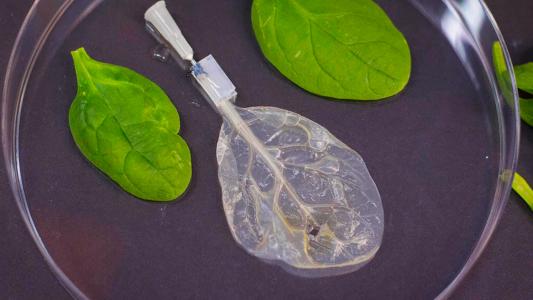When people shop at the local grocery store, how the food arrived there is barely on their mind. From farm to store — somehow, it ends up on the shelves. Meanwhile food waste is invisible.
But the process of bringing produce to the market can be a convoluted mess. When a farmer or supplier needs a specialized truck that controls temperature and humidity to transport their produce, it isn’t easy.
“Pick up the phone and call five brokers in your network, those four or five brokers will call five other carriers in their network who will pick up the phone and call the drivers,” Syed Aman, former Walmart director of supply chain technology said. “So by the time they get to the price, it’s pretty much soft negotiations and haggling.”
In the meantime, the clock is ticking on the produce’s limited shelf life.
When Aman worked for Walmart, building their online grocery shopping platform, he realized that this hassle often led to truckloads of fresh produce being wasted simply because of logistical inefficiencies.
He doesn’t want to see a single ear of corn or one head of broccoli go to waste — so, he left Walmart to start Hwy Haul, a startup that automates the process of trucking freight, specifically produce, with artificial intelligence. He hopes it will eliminate the cumbersome game of telephone that many suppliers experience when they are looking for a trucker to transport their produce.
“I did not want to lose even a single day on the missed opportunity because it was very sad to see what’s happening to the fresh produce,” said Aman. “That’s ridiculous. It cannot happen. The world needs more food, and the population is growing.”
Wasted Opportunities
The U.S. tosses out more than 400 pounds of food per person each year. It is the largest component of disposed municipal solid waste in the country and makes up nearly a quarter of landfill material. When food is wasted, so is the energy and resource it took to produce that food — such as water and carbon emissions from transportation. Nearly a quarter of global carbon emissions are due to the food industry. Food waste is a problem at all points of the supply chain, from farm to table.
Using digital platforms to optimize the transportation logistics of durable goods, like washing machines, is much more straightforward. But moving produce, “This is an extremely hard problem to solve,” Aman said.
Sixteen percent of food waste happens when food is harvested, stored, and transported — before it even reaches the retail level.
“This adds up to $15 billion worth of produce wasted every year. Key reasons are highly manual ways of scheduling, routing, multiple hops from growers to distributors to wholesalers to retailers, and lack of cold-chain compliance and monitoring,” says Aman.
There are approximately 1.2 million trucking companies in the U.S. Most of them are mom-and-pop shops, with more than 90% operating fewer than six trucks.
Ryan Camacho, the director of product management at Axele, a company that facilitates logistics for many types of products, echoes Aman’s sentiment.
After being in the business for 12 years, Camacho says that the two biggest challenges are sourcing reliable truckers to move a product, and maintaining true visibility of the goods.
“It’s tough to go through a broker because you don’t know which truck they are going to use, what service, and how reliable they are. And it is really hard for brokers to get tracking details back from the carrier (truck driver) and convey them back to the shipper in a timely manner,” he says.”There are so many problems in the world of logistics and it is all about connecting people and trying to provide visibility.”
You can think of Hwy Haul like a digital broker who aims to automate transparency and reliability by combining the fragmented industry into one single platform. Aman calls Hwy Haul a “managed marketplace.”
It is a cloud-based digital platform that instantly connects growers to truckers. Through the platform, you can get a quote, schedule a vetted driver, and monitor progress, temperature, and humidity levels while en route, alerting the driver and grower of any delays or problems.
“The issues happen when there’s a breach of temperature or if the quality of the product comes in a little bad and we have issues with it,” said Jorge Reza, the logistics manager at Fortune Growers, a company that manages multiple farms in the U.S. and Mexico.
Reza says that the biggest challenge of moving broccoli from the largest broccoli growers in Mexico all the way to Canada’s east coast is finding reliable transportation. But that has been more consistent since he began working with Hwy Haul when it launched a few years ago.
“Let’s say one of their trucks breaks down. They inform you of it immediately to where I can let my customers know, and then they can source our product elsewhere,” Reza said.
“Other trucking companies won’t communicate that along the way. Everything seems to be fine. Then, stores don’t get the product, customers don’t get the products, and everybody’s upset. I don’t have those issues with Hwy Haul.”
Hwy Haul’s additional capabilities include instant quotes in the U.S. and Canada, real-time freight tracking, and proof of delivery.
Turning Up The Heat
The FDA’s Food Safety Modernization Act stipulates that all food transport fleets have to verify they monitored and maintained the proper temperature while transporting food. But cold chain (temperature-controlled supply chain) compliance isn’t always transparent.
Some truckers will raise the temperature to save on fuel, then lower them again to make their arrival within the required temperature limits, says Jessie VanderVeen, chief media officer of Controlant, which creates technology to monitor cold chain products. Since temperatures might only be taken at the beginning and end of the transport, the grocer or retailer that receives the produce wouldn’t know the temperature was adjusted.
Hwy Haul aims to fix that and secure the longevity and safety of the produce. If a truck’s temperature drops below the predetermined threshold, the driver and customer will receive an alert.
The Covid-19 pandemic, and struggle to transport and distribute vaccines efficiently, has highlighted the importance of cold chain technology and difficulties of transporting food — prompting companies to consider how they can innovate their supply chains.
Controlant is using hardware and cloud-based software to track temperature, product location, and quality data in real-time. They recently announced they are overseeing Pfizer-BioNTech COVID-19 vaccine distribution.
Other companies also innovating in food transportation include Varcode’s smart tags, which will keep track of temperature and other vital data during transportation. Shift aims to automate the food-inspection process. And Silo is automating the marketplace for buying and selling wholesale produce.
Thanks to innovative startups rethinking the food transportation process, more trucks should arrive at stores on time with fresh produce.
We’d love to hear from you! If you have a comment about this article or if you have a tip for a future Freethink story, please email us at [email protected].






